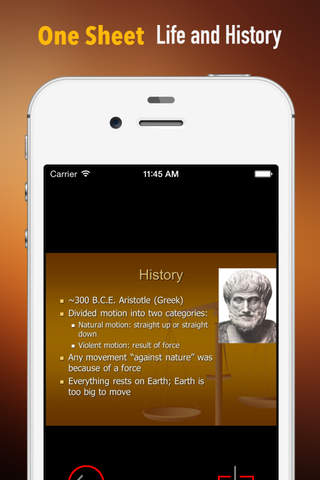
Aristotle Biography and Quotes: Life with Documentary app for iPhone and iPad
Developer: CloudyBrain.com
First release : 01 Jul 2016
App size: 76.39 Mb
Want to learn All about Aristotle biography, his famous quotes, and to watch his documentary all in one App? This is for you.
Features:
- Visualized history and biography, for easy learning and reference
- Famous Quotes to get inspiration
- Documentary or speeches to bring you virtually back to the history
- Having everything about Aristotle in one App.
Brief Introduction of Aristotle:
Aristotle (384–322 BC) was a Greek philosopher and scientist born in the city of Stagira, Chalkidice, on the northern periphery of Classical Greece. His father, Nicomachus, died when Aristotle was a child, whereafter Proxenus of Atarneus became his guardian. At eighteen, he joined Platos Academy in Athens and remained there until the age of thirty-seven (c. 347 BC). His writings cover many subjects – including physics, biology, zoology,metaphysics, logic, ethics, aesthetics, poetry, theater, music, rhetoric,linguistics, politics and government – and constitute the first comprehensive system of Western philosophy. Shortly after Plato died, Aristotle left Athens and, at the request of Philip of Macedon, tutored Alexander the Great starting from 343 BC. According to the Encyclopædia Britannica, "Aristotle was the first genuine scientist in history ... every scientist is in his debt."
Teaching Alexander the Great gave Aristotle many opportunities and an abundance of supplies. He established a library in the Lyceum which aided in the production of many of his hundreds of books. The fact that Aristotle was a pupil of Plato contributed to his former views of Platonism, but, following Platos death, Aristotle immersed himself in empirical studies and shifted from Platonism to empiricism. He believed all peoples concepts and all of their knowledge was ultimately based on perception. Aristotles views on natural sciences represent the groundwork underlying many of his works.
Aristotles views on physical science profoundly shaped medieval scholarship. Their influence extended into the Renaissance and were not replaced systematically until the Enlightenment and theories such as classical mechanics. Some of Aristotles zoological observations, such as on the hectocotyl (reproductive) arm of the octopus, were not confirmed or refuted until the 19th century. His works contain the earliest known formal study of logic, which was incorporated in the late 19th century into modern formal logic.
In metaphysics, Aristotelianism profoundly influenced Judeo-Islamic philosophical and theological thought during the Middle Ages and continues to influence Christian theology, especially the scholastic tradition of theCatholic Church. Aristotle was well known among medieval Muslim intellectuals and revered as "The First Teacher" (Arabic: المعلم الأول).
His ethics, though always influential, gained renewed interest with the modern advent of virtue ethics. All aspects of Aristotles philosophy continue to be the object of active academic study today. Though Aristotle wrote many elegant treatises and dialogues – Cicero described his literary style as "a river of gold" – it is thought that only around a third of his original output has survived.
We look forward your feedback and comment to improve your experience with this application.



